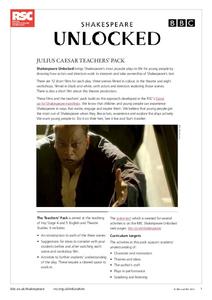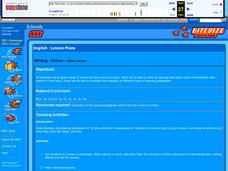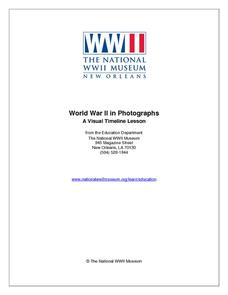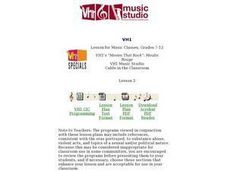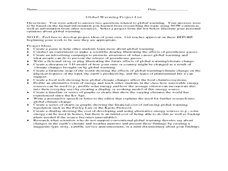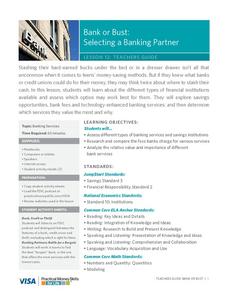BBC
Julius Caesar Teacher Pack
A great actor has the ability to make or break a play. A series of lesson plans related to William Shakespeare's Julius Caesar looks closely at the choices actors make during a production of the play to help provide insight into the...
Rochester Institue of Technology
Ergonomic Packing
Pupils revisit the concepts of ergonomics and order picking examined in previous lesson and use the results of a simulation to brainstorm ergonomic designs for medical supply stations.
Denver Public Schools
Kung-hsi Fa-ts' ai! – A Chinese New Year Celebration
Looking for ideas for your Lunar New Year celebration? Check out an interdisciplinary unit of study that includes lessons in counting, calligraphy, culture, geography, literature, art, and music. Kung-hsi Fa-ts' ai! (May you...
Curated OER
A Letter from Miami: A Telenovela
Learners create their own telenovelas. In this telenovela lesson plan, students use the graphic organizer to work in groups and create a telenovela based on the mysterious letter.
Curated OER
Writing - Fiction
After listening to the opening description in Of Mice and Men, high schoolers try their hand at writing a short story that includes a mugging. The story should include all five senses. Each of the pupils reads their opening paragraph to...
Curated OER
"The Merchants of Cool"
Why are so many advertisements geared towards the teenage population? Watch a video with your class (link included), and have them fill out the attached listening guide. Then discuss persuasion, presenting biased information, and where...
Film English
Mixtape
A short film about music is the inspiration for a well-sequenced lesson that includes discussion, group work, and writing. After the whole class converses about music, small groups write narratives about a still from the film. Pupils...
PBS
Universal Declaration of Human Rights
What rights are guaranteed to learners? Do they align with the Universal Declaration of Human Rights, which was approved by the United Nations in 1948? Middle and high schoolers present persuasive arguments about the rights they believe...
National WWII Museum
World War II in Photographs
A picture is worth a thousand words, and this activity is worth so much more! Learners closely analyze a series of photographs from World War II, matching them with their appropriate captions and sequencing them into a correct...
Incredible Art
Historical Narrative Using Silhouettes
Connect art and history with a series of activities inspired by the work of contemporary artist, Kara Walker. After watching an Art 21 video about Walker and examining the images in a PowerPoint presentation, class members use...
Curated OER
Junior High School Lesson Plan
Students play a board game in order to review the details from a travel essay. In this board game lesson, students listen the a story about a trip, ask questions regarding it, and review the story by playing the board game on the...
Curated OER
Max and Wife
Students participate in a game to see who knows each other best. In this getting to know you lesson, students discuss several questions and work in pairs to get to know each other. Students are then asked questions about...
Curated OER
Woman Power!!! Mathematics Camp
Students explore mathematics by researching stereotypes. In this gender bias lesson plan, students participate in discussions where they identify traditional careers according to their own gender. Female students attend summer camp and...
Pimsleur
Culinary Culture
Italian culture and italian food go together. Have small groups find out all about food-related culture through research and translation. Class members conduct online research, create glossaries, find and translate recipes for a...
Special needs in Music
Music Work Sheet (Special Ed)
Music is beneficial for all learners. Help your learners with special needs learn about different styles of music, as well as the ways that music is represented on paper, with 30 different worksheets.
VH1
Lesson 2: Moulin Rouge
The pop movie Moulin Rouge was based on the opera La Boheme. Learners watch the last 30 minutes of each musical to compare and contrast social opposites. They'll first discuss the social differences of the main characters and how those...
Missouri Department of Elementary
Safe and Healthy Life Choices (Part 2)
Scholars listen to a presentation by a health care professional and then submit three questions they would like the speaker to discuss further.
Web English Teacher
Reflexive and Intensive Pronouns
Myself. themselves, himself. Class members engage in an intensive study and reflect on the uses of reflective and intensive pronouns.
Curated OER
The Learning Network Fill-In: Macbeth for Children
Help your learners attain vocabulary and practice reading comprehension with this cloze activity. Created by The Learning Network, this resource provides a New York Times article with the words already removed. Pupils can fill in the...
Curated OER
Conversation Lesson – Music
Students discuss the type of music they listen to and discuss a set of music related words put on the board by the teacher. In this music lesson plan, students work in pairs to discuss words and complete an activity asking questions of...
Curated OER
The Flatmates Episodes 76 & 77: Writing an Advert
Students analyze and write their own advertisements. For this media lesson plan, students study vocabulary and make predictions as they complete worksheets and activities based on advertising.
Curated OER
Lesson Plan: Global Warming
Students explore the concept of global warming. In this climate change lesson plan, students explore the provided links to PBS NOW sources and research the greenhouse effect and the effects of global warming. Students support their...
Visa
Bank or Bust: Selecting a Banking Partner
Why shouldn't we just save all our money in our mattress? Couldn't our money disappear? Pupils discover the benefits of utilizing banks and credit unions for saving money, as well as how to evaluate different types of...
Humanities Texas
Primary Source Worksheet: Franklin D. Roosevelt, First Inaugural Address
Young historians will learn not to fear primary source materials (or fear itself, for that matter) thanks to this resource that uses Franklin D. Roosevelt's March 4, 1933 Inaugural Address to model how to conduct a close reading of such...
